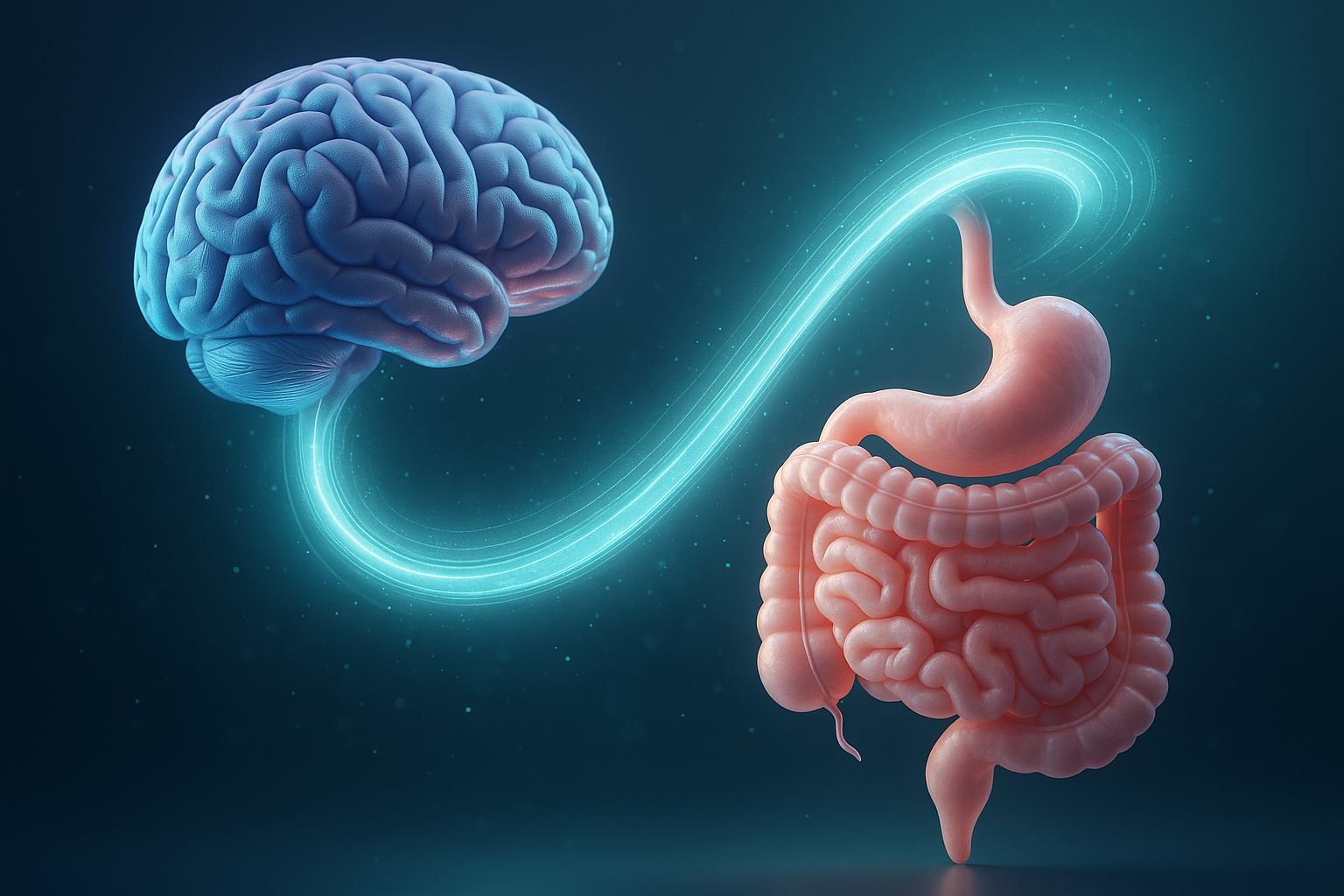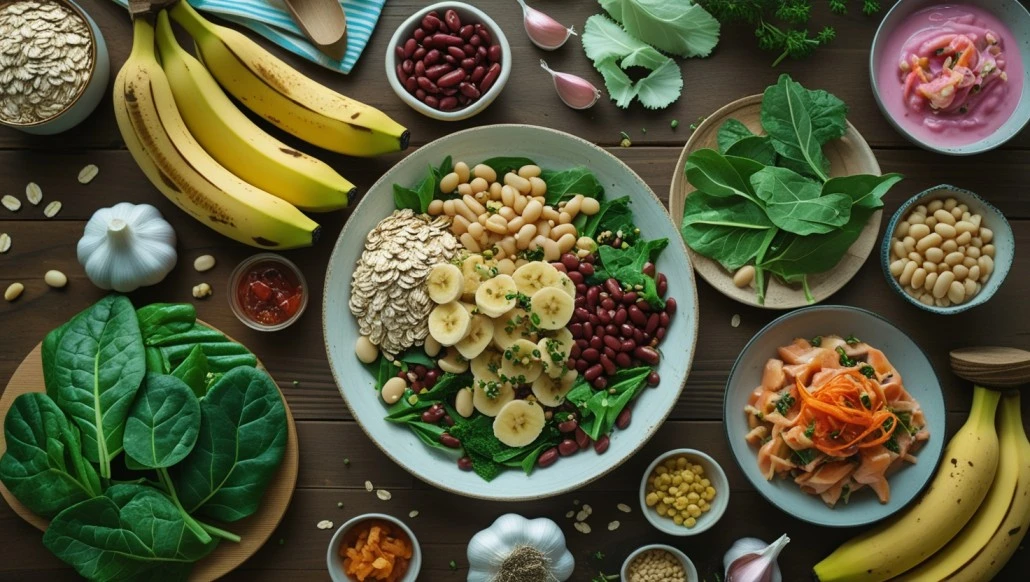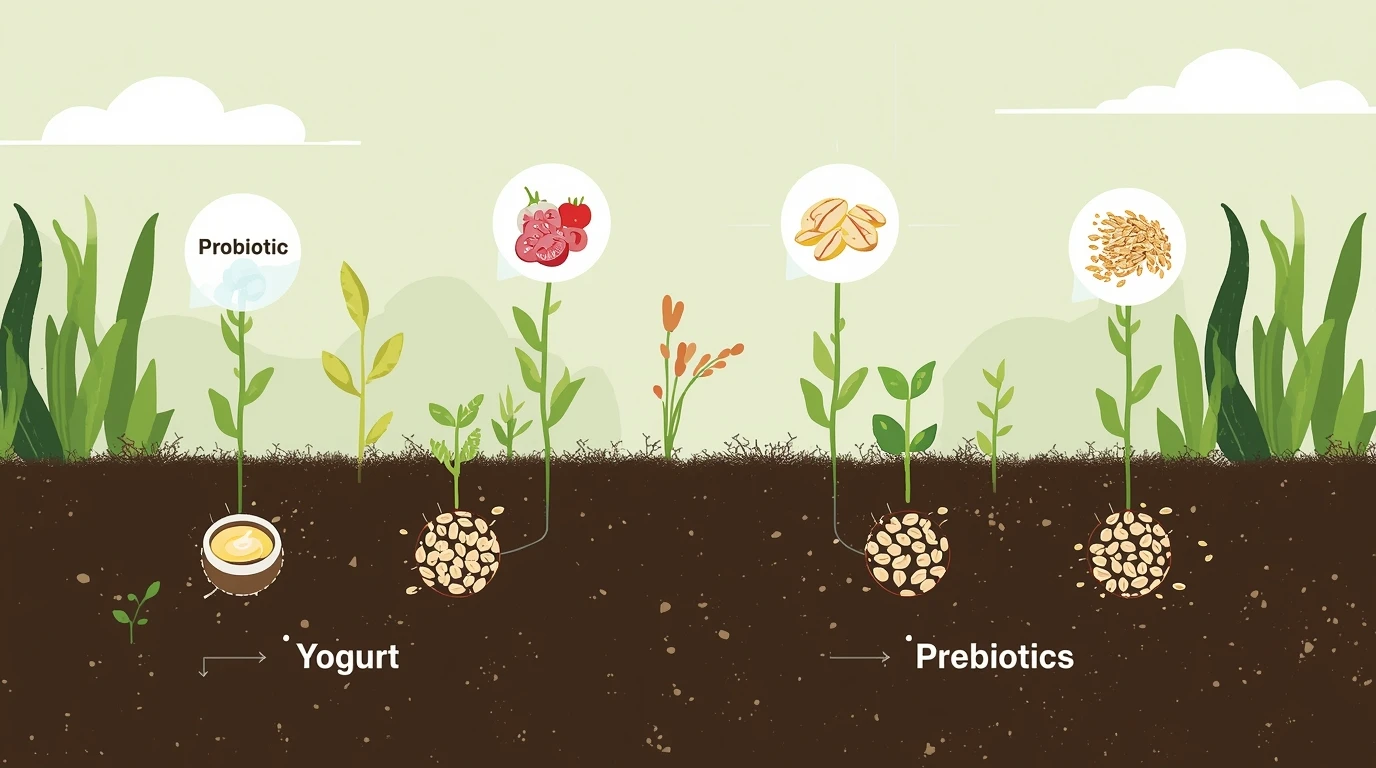The Hidden Key to Lasting Energy and a Clear Mind: Your Gut Health After 40
Introduction
Do you often feel tired, bloated, or foggy? Many of us, especially after 40, notice these shifts. We might blame it on ‘just getting older’ or a busy life. But what if these common complaints aren’t inevitable? What if the secret to feeling vibrant again isn’t a new diet, but something far more fundamental, and often overlooked? It’s a hidden world within you, a bustling ecosystem that holds immense power over your well-being. Understanding it could be the game-changer you’ve been searching for.
Ready to unlock the surprising truth about what’s really going on inside your body, and how it can transform your daily life? Let’s dive in.
Your Gut: The Unsung Hero of Your Well-being (and Why It Changes After 40)

Imagine a bustling city within you, teeming with trillions of microscopic residents. This isn’t science fiction; it’s your gut, specifically your gut microbiome. This incredible community of microbes plays a starring role in everything from digesting food and absorbing nutrients to influencing your immune system, mood, and even your weight. It’s a complex, dynamic ecosystem, and its health directly impacts yours.
As we cross 40, natural shifts occur that can significantly impact this delicate balance. You might be experiencing these changes without realizing it, attributing symptoms to other factors. Here’s what you might be ignoring that’s contributing to your daily struggles:
- Decreased Stomach Acid: Our stomach’s acid production tends to decrease with age, leading to indigestion, bloating, and reduced nutrient absorption.
- Hormonal Shifts: For women, perimenopause and menopause bring hormonal fluctuations that impact gut motility and microbiome diversity, contributing to bloating and changes in bowel habits.
- Microbiome Diversity Declines: The rich diversity of our gut microbes can begin to decline after 40, making the ecosystem less resilient. For women, this shift can be particularly noticeable during menopause.
- Reduced Nutrient Absorption and Motility: The efficiency of nutrient absorption and food movement through your digestive tract can slow down, leading to constipation and sluggishness.
These age-related changes are a call to action. Understanding them is the first step towards taking proactive steps to support your gut and, in turn, your overall vitality. Ignoring these shifts can lead to compounding symptoms, making you feel older and more tired than you need to be. But the good news? You have more control than you think.
The Telltale Signs Your Gut Needs a Little Love
How do you know if your gut is sending out an S.O.S.? Your body is constantly communicating. If you pay close attention, you might recognize these common indicators:
- Persistent Bloating and Gas: That uncomfortable, distended feeling that seems to linger.
- Unexplained Fatigue and Low Energy: Waking up tired or hitting that mid-afternoon slump.
- Mood Swings, Anxiety, or Irritability: Your gut directly impacts your neurotransmitters, affecting your mood.
- Mental Fog and Difficulty Concentrating: Inflammation in the gut can affect cognitive function.
- Skin Issues: Breakouts, eczema, and other skin conditions can reflect gut imbalances.
- Frequent Illnesses: A significant portion of your immune system resides in your gut; a compromised gut can weaken your immunity.
- Changes in Bowel Habits: Chronic constipation, persistent diarrhea, or alternating between the two.
These symptoms are your body’s way of whispering (or sometimes shouting) that something is off. Ignoring them is like ignoring the check engine light in your car – eventually, a small issue can become a much bigger problem. Once you understand these signals, you’re empowered to take action.
The Gut-Brain Connection: More Than Just a Gut Feeling

Ever felt butterflies in your stomach when nervous? Or a knot when stressed? These sensations highlight the incredible connection between your gut and your brain. This two-way communication highway, the gut-brain axis, influences everything from your mood to your cognitive function.
Your gut produces many neurotransmitters found in your brain, including about 90% of your body’s serotonin – the ‘feel-good’ chemical. So, an imbalanced gut can directly impact your brain chemistry, leading to mood swings, anxiety, and mental fog. It’s not just in your head; it’s in your gut!
Let me tell you about Sarah. Sarah, a vibrant 48-year-old teacher from Ohio, felt constantly tired and bloated, with waning patience and a foggy memory. She initially dismissed it as aging, but a friend suggested looking into her gut health. Sarah learned how her gut issues likely contributed to her low energy and mood fluctuations. This realization was a pattern interrupt, shifting her focus from managing symptoms to addressing the root cause. She was curious: could her gut really be the missing piece?
What’s Hurting Your Gut? (And What You Might Be Eating Daily)
It’s easy to fall into dietary habits that, while seemingly harmless, can wreak havoc on your gut. Ignoring these common culprits might be what’s keeping you tired, bloated, and foggy. Have you noticed this in yourself?
The Worst Offenders: A Quick Checklist
Here are common dietary culprits that can disrupt your gut microbiome:
- Highly Processed Foods: Loaded with unhealthy fats, sugar, artificial ingredients, and preservatives. They lack fiber and nutrients, promoting inflammation.
- Refined Sugars and Artificial Sweeteners: Sugar feeds harmful bacteria, while artificial sweeteners can negatively alter your gut microbiome.
- Excessive Red Meat and Processed Meats: Low in fiber and harder to digest, they can negatively influence gut bacteria.
- Fried Foods: Difficult to process, contributing to indigestion and inflammation.
- Alcohol: Can irritate the digestive tract lining, increase gut permeability, and disrupt gut bacteria balance.
- Certain Dairy and Gluten (for sensitive individuals): Can trigger inflammation, bloating, and digestive distress.
Being aware of these foods is the first powerful step. Small, consistent changes can lead to significant improvements. Your gut will thank you.
Nourishing Your Inner Garden: Foods That Love Your Gut Back

Now for the exciting part! A whole world of delicious, vibrant foods can nourish your gut. Think of every meal as an opportunity to invest in your well-being. Every bite of gut-friendly food is a mini-win, a small step towards more energy, a clearer mind, and a happier you.
What should you be adding to your plate? Let’s explore the key players in a gut-loving diet:
- Fiber-Rich Foods: The superhero of gut health. Acts as a prebiotic, feeding beneficial gut bacteria and promoting regularity. Found in fruits, vegetables, legumes, and whole grains.
- Fermented Foods: Natural sources of probiotics, helping to repopulate your gut with good bacteria. Look for yogurt, kefir, sauerkraut, kimchi, and kombucha.
- Polyphenol-Rich Foods: Powerful plant compounds that reduce inflammation and support beneficial gut bacteria. Found in berries, dark chocolate, green tea, and colorful fruits and vegetables.
Your Gut-Friendly Plate: Simple Swaps for Daily Wins
Ready to put this into practice? Here are simple, actionable swaps:
- Breakfast Boost: Oatmeal with berries and nuts/seeds. Try this today: Add plain yogurt for a probiotic boost.
- Lunchtime Upgrade: A colorful salad with lean protein. Think about this: How can you add one more color to your lunch salad tomorrow?
- Smarter Snacking: Almonds, an apple with nut butter, or yogurt. These provide fiber, protein, and healthy fats.
- Dinner Diversity: Fill half your plate with a variety of colorful vegetables. Have you noticed this in yourself? Challenge yourself to try one new vegetable this week.
Every small change adds up. You don’t have to be perfect. Just focus on making one better choice at a time. Your gut, and your entire body, will thank you for it.
Probiotics vs. Prebiotics: Your Gut’s Dynamic Duo

Understanding the distinct roles of probiotics and prebiotics is crucial for nurturing your gut. Think of your gut as a garden: the ‘plants’ are the beneficial bacteria, and the ‘soil’ is what feeds them.
- Probiotics: The Good Guys (The Plants): Live microorganisms that add to the population of healthy microbes in your gut. Found in fermented foods like yogurt, kefir, sauerkraut, kimchi, and kombucha.
- Prebiotics: The Food for the Good Guys (The Soil): Non-digestible fibers that become food for your beneficial gut bacteria, helping them grow and thrive. Found in garlic, onions, leeks, asparagus, bananas, apples, oats, and flaxseeds.
For optimal gut health, it’s not just about consuming probiotics; it’s equally important to provide them with the fuel they need – the prebiotics. This powerful combination is often referred to as ‘synbiotics’.
Do You Need a Supplement?
Ideally, get most of your probiotics and prebiotics from whole foods. However, supplements might be beneficial:
- After Antibiotics: To help repopulate your microbiome.
- Specific Health Conditions: If dealing with persistent digestive issues, under professional guidance.
- Dietary Restrictions: If getting enough from food alone is difficult.
Always consult with a doctor or registered dietitian before taking supplements. They are meant to supplement a healthy diet, not replace it.
Beyond Food: Lifestyle Habits for a Happy Gut

Your lifestyle habits significantly impact your gut microbiome and overall digestive function. Think of it as creating the perfect environment for your gut garden to flourish.
Let me introduce you to David. David, a 52-year-old accountant from Texas, struggled with brain fog and mood swings. He initially blamed work stress, but his doctor suggested exploring the gut-brain connection. This was a powerful pattern interrupt, and he was ready to try something different.
Here are crucial lifestyle habits for a happy gut:
- Stress Management: Chronic stress can negatively impact gut motility and bacteria balance. Find healthy ways to manage stress, like meditation or spending time in nature. Think about this: What’s one small stress-reducing activity you can incorporate into your day?
- Quality Sleep: A disrupted gut can impact sleep, and poor sleep affects your gut. Aim for 7-9 hours of quality sleep. Have you noticed this in yourself? Does a bad night’s sleep make your digestive issues worse?
- Regular Physical Activity: Consistent movement increases gut microbiome diversity and improves motility. Even a daily brisk walk helps.
- Hydration: Essential for digestion, helping move food and keeping stools soft. Drink plenty of water throughout the day.
David started with small changes: daily meditation, consistent sleep, and lunch break walks. Within weeks, his brain fog lifted, mood stabilized, and energy returned. He realized nurturing his entire system, starting with his gut, was key.
Your Journey to a Thriving Gut Starts Now
You’ve taken the first, most crucial step: gaining knowledge. You now understand that your gut is a powerful center influencing your energy, mood, and mental clarity, especially after 40. You’ve learned about the subtle shifts that occur with age, the foods that can hinder your progress, and the nourishing choices that can help your gut flourish. And you’ve seen how real people, like Sarah and David, found profound relief by addressing their gut health.
This isn’t about perfection; it’s about progress. You have the power to transform your health from the inside out. Imagine waking up feeling truly refreshed, with a clear mind and a comfortable body. This isn’t a pipe dream; it’s an achievable reality when you prioritize your gut.
But before you go, there are a few more things you absolutely need to know to solidify your understanding and empower your next steps.
Your Next Step: Grab Your Free Gut-Friendly Meal Planner!
Feeling inspired to take control of your gut health? We know that making dietary and lifestyle changes can feel overwhelming. That’s why we’ve created a simple, actionable resource just for you.
Ready to transform your plate and your gut?
Click here to download your FREE “7-Day Gut-Friendly Meal Planner”!This planner is designed to make healthy eating easy and delicious, with simple recipes and meal ideas that nourish your gut from the inside out. It’s your perfect companion for starting your gut-healing journey today.
Conclusion
Your gut is a powerful ally in your quest for lasting energy, mental clarity, and emotional balance, especially as you navigate the unique landscape of life after 40. By understanding the subtle changes that occur with age, making conscious food choices, and embracing gut-friendly lifestyle habits, you’re nurturing the very foundation of your health.
Remember, this journey is about empowerment, not perfection. Every small, consistent step you take towards a healthier gut is a profound investment in your future self. You have the power to reclaim your vitality, quiet the bloating, sharpen your mind, and stabilize your mood. Start today. Your gut, and your entire being, will thank you for it.
Q: How long does it take to heal your gut?
A: The timeline varies greatly, depending on the severity of the imbalance and consistency of new habits. Some notice improvements in weeks, others months. Consistency and sustainable changes are key.
Q: Can gut health affect weight?
A: Absolutely! Your gut microbiome influences metabolism, nutrient absorption, and fat storage. An imbalanced gut can contribute to weight gain. Addressing gut health can be a crucial piece of the weight management puzzle.
Q: What about antibiotics and gut health?
A: Antibiotics can disrupt your gut microbiome. If you take them, consider a high-quality probiotic supplement a few hours apart from your antibiotic dose, continuing for several weeks after. Always consult your doctor or pharmacist. This is important for gut healing foods after antibiotics.